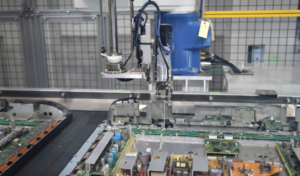 30/09/2021
30/09/2021E-waste is the fastest growing waste stream in the world. Most of it is mishandled, leading to more pollution, more greenhouse gas emissions and the loss of scarce and critical materials. Digitalisation can go a long way to establishing a circular management of e-waste and, thereby, a circular and sustainable economy.
Digital solutions such as AI, blockchain or robotics can help to better collect and treat our discarded phones, televisions and computers, or to prevent them from becoming waste in the first place, by making information easier to share, improving processes and connecting the relevant actors across the value chain.
However, despite their potential, these new technologies can also present challenges. The uptake of digital solutions by waste operators and producer responsibility organisations (PROs) are often hindered by costs and the EU’s fragmented market for e-waste management. Concerns over data protection can create obstacles to accessing and sharing data of relevance to circular e-waste management. If not steered properly, digital transformation can also lead to negative side effects, such as more e-waste. For e-waste management to become more circular and digital, policy must back it up.
As the EU explores ways to promote the twin digital and green transition, improving e-waste management provides a timely and important case in practice. The EU should implement the following policy recommendations:
- Create a fully circular value chain for e-waste in the EU by 2030 and pursue the goal of establishing a circular e-waste system at the global level by 2050. The EU should become a global leader in using digitalisation to improve waste prevention, collection and recycling and minimise exports.
- Use EU regulation and soft law to develop rules and standards for e-waste data management. This entails finalising the common European data space, developing common rules on using DPPs in electronics, and developing guidelines on how PROs and waste operators could manage their data
- Use EU financial instruments under the 2021-27 Multiannual Financial Framework and Next Generation EU recovery instrument to support PROs and waste operators in installing and deploying the latest technologies to better manage e-waste
- Establish a single market for e-waste to incentivise private investments in the uptake of digital solutions for e-waste management
- Use digital tools to enhance the enforcement of e-waste-related policies, to end illegal waste shipments and other mishandlings of e-waste.
Read more in a freshly released report commissioned by the WEEE Forum and SENS eRecycling and drafted by European Policy Centre and watch the recording of the webinar that took place on 30 September to present and discuss the study.
About
The WEEE Forum a.i.s.b.l. is an international association representing 51 producer responsibility organisations across the globe. Together with our members, we are at the forefront of turning the extended producer responsibility principle into an effective electronic waste management policy approach through our combined knowledge of the technical, business and operational aspects of collection, logistics, de-pollution, processing, preparing for reuse and reporting of e-waste. Our mission is to be the world’s foremost e-waste competence centre excelling in the implementation of the circularity principle.
Transparency Register ID 702397445-73.
Copyright 2019 All Rights Reserved
Contact
BluePoint conference and
business centre
Boulevard Auguste Reyerslaan 80
B-1030 Brussels
Belgium
Newsletter
Subscribe to our mailing list to get the updates to your email inbox.